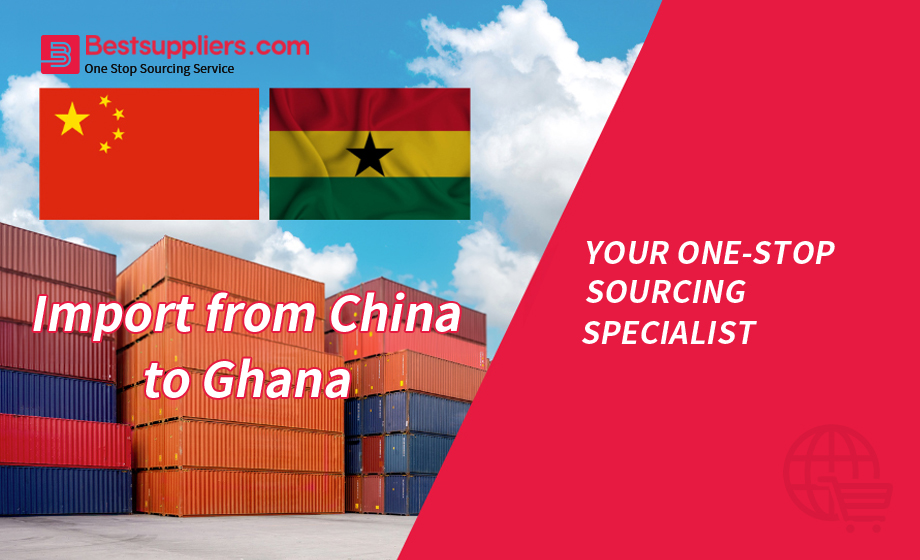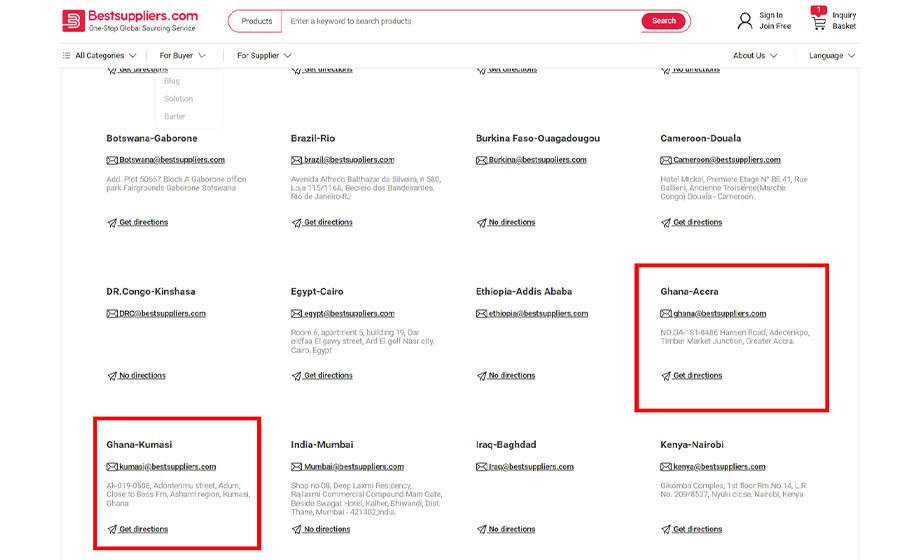Import from China to Ghana

I. Introduction:
Importing goods from China to Ghana can be a lucrative business venture for entrepreneurs seeking to tap into a wide range of product options and competitive pricing. However, it is important to navigate the import process effectively to ensure a smooth and successful operation. This article provides a comprehensive guide on how to import from China to Ghana, highlighting the benefits, challenges, and key considerations at each stage.
II. Overview of Importing from China to Ghana:
When importing from China to Ghana, you have access to a vast array of products, ranging from electronics and textiles to machinery and consumer goods. China's robust manufacturing industry and competitive pricing make it an attractive sourcing destination for Ghanaian businesses. By importing from China, you can expand your product offerings, access affordable goods, and potentially increase profitability.
III. What Goods Does Ghana Import from China?
Ghana imports a wide range of goods from China, covering various industries and consumer needs. The most common imports from China include:
● Electronics and electrical equipment;
● Machinery;
● Textiles and apparel;
● Furniture;
● Plastics;
● Vehicles, and their components.
Additionally, Ghana also imports raw materials from China to support its manufacturing and construction sectors. Those items include:
● Chemicals;
● Metals;
● Minerals.
The diverse range of imported goods from China reflects Ghana's reliance on Chinese products to meet domestic demands and fuel economic growth. Bestsuppliers has many categories of products.
IV. Benefits of Importing from China:
Importing from China offers several advantages for Ghanaian businesses. Firstly, China's manufacturing capabilities and economies of scale allow for cost-effective production, resulting in competitive pricing. This can give you a significant edge in the Ghanaian market. Secondly, China's extensive product range ensures that you can find suitable options for various industries and consumer demands. Moreover, importing from China allows you to access innovative and high-quality products that may not be readily available domestically.
VI. Challenges of Importing from China:
While importing from China presents numerous benefits, it also comes with its fair share of challenges. One of the primary concerns is ensuring product quality and safety. Due to the distance involved and potential language barriers, it can be challenging to assess the quality of products before importation. Additionally, navigating import regulations and requirements, customs procedures, and cultural differences can be complex and time-consuming. It is crucial to address these challenges effectively to minimize risks and maximize success.
VII. Finding the Right Products to Import:
Identifying Popular Products in Ghana:
To maximize your chances of success, identify popular products in the Ghanaian market. Conduct market research to understand consumer preferences, trends, and demands. Explore opportunities in sectors experiencing growth or under-served niches where you can meet specific consumer needs.
Conducting Market Research in Ghana:
In-depth market research in Ghana is crucial to determine the viability of importing specific products. Analyze market size, competition, pricing dynamics, and consumer behavior. This information will guide your product selection and help you tailor your offerings to suit local preferences.
Analyzing Demand and Competition:
Evaluate the demand for potential products and assess the level of competition. Identify gaps in the market where your imported goods can fulfill unmet needs. Consider factors such as pricing, quality, branding, and unique selling propositions to differentiate your offerings from competitors.
Identifying Profitable Niches and Trends:
Identifying profitable niches and emerging trends is key to import success. Look for product categories with high profit margins and growth potential. Stay updated with industry news, consumer trends, and technological advancements to capitalize on new opportunities.
VIII. Sourcing Suppliers in China:
Researching Potential Suppliers in China:
Conduct extensive research to find potential suppliers in China. Utilize online directories, industry trade shows, and professional networks to identify reliable manufacturers and suppliers. Consider factors such as production capacity, product specialization, and export experience.
Evaluating Supplier Reliability and Credibility:
Ensure that your chosen suppliers are reliable and trustworthy. Request references or reviews from previous clients to assess their reputation. Verify their business licenses and certifications. Evaluate their communication responsiveness and willingness to provide samples and necessary documentation.
Comparing Product Quality and Pricing:
Compare the product quality and pricing offered by different suppliers. Request samples to evaluate the craftsmanship, materials used, and overall quality of their products. Consider the pricing structure, including factors such as bulk order discounts, shipping costs, and payment terms.
Communication and Negotiation with Suppliers:
Establish effective communication channels with your selected suppliers. Communicate your requirements, expectations, and quality standards. Negotiate pricing, terms, and conditions to ensure a mutually beneficial agreement. Maintain open lines of communication throughout the import process.
IX. Ensuring Product Quality and Safety:
Understanding Quality Control Processes in China:
Understanding the quality control processes in China is crucial to ensure consistent product quality. Engage suppliers who implement strict quality control measures throughout the manufacturing process. Consider working with manufacturers that adhere to internationally recognized quality management systems such as ISO 9001.
Conducting Product Inspections and Quality Tests:
To mitigate quality risks, conduct thorough product inspections and quality tests. Engage professional third-party inspection agencies or employ quality control personnel to inspect products before shipment. This step helps identify any defects, non-compliance issues, or deviations from your specifications.
Verifying Compliance with Safety Regulations:
Prioritize product safety by verifying compliance with relevant safety regulations in both China and Ghana. Familiarize yourself with safety standards, certifications, and testing requirements for your specific product category. Ensure that your suppliers can provide the necessary documentation and certifications to demonstrate compliance.
Implementing Product Certification and Labeling:
Ensure that your imported products meet all necessary certification and labeling requirements in Ghana. Research the specific labeling guidelines for your product category and work with your suppliers to ensure accurate and compliant labeling. Proper certification and labeling instill confidence in consumers and demonstrate your commitment to quality and safety.
X. Shipping and Logistics:
● Choosing the Right Shipping Method:
Selecting the appropriate shipping method is crucial to ensure timely and cost-effective delivery. Consider factors such as shipment size, urgency, and budget when choosing between air freight, sea freight, or a combination of both. Evaluate the transit times, reliability, and associated costs of each option.
● Understanding Shipping Terms and Incoterms:
Familiarize yourself with shipping terms and Incoterms (International Commercial Terms) to ensure clear communication with suppliers and freight forwarders. Understand the responsibilities, risks, and costs associated with each Incoterms, such as FOB (Free on Board), CIF (Cost, Insurance, and Freight), DDU, CFR, EXWorks, DDP, Bill of Lading, and so on.
● Managing Customs Clearance and Documentation:
Managing customs clearance and documentation is crucial for a smooth import process. Ensure you have the necessary paperwork, including commercial invoices, packing lists, and bills of lading or airway bills. Partner with experienced customs brokers or freight forwarders who can guide you through the customs procedures.
● Calculating Shipping Costs and Transit Times:
Accurately calculate shipping costs and transit times to include them in your import planning and pricing. Consider factors such as shipment weight, volume, shipping method, and destination. Obtain quotes from multiple freight forwarders and shipping providers to compare costs and services.

XI. Import Duties, Taxes, and Customs Procedures:
● Understanding Import Duties and Taxes in Ghana:
Import duties and taxes can significantly impact the cost of importing goods into Ghana. Research and understand the applicable tariff rates, value-added tax (VAT), and any other taxes or levies imposed by Ghanaian customs authorities. Consider these costs when calculating your product pricing and overall import budget.
● Navigating Customs Procedures and Documentation:
Navigating customs procedures and documentation can be complex. Ensure compliance with customs regulations by accurately completing the required paperwork and declarations. Properly classify your imported products according to the Harmonized System (HS) codes to determine the applicable duties and taxes.
● Working with Freight Forwarders and Customs Brokers:
Engage experienced freight forwarders and customs brokers to streamline the customs clearance process. These professionals can assist with document preparation, customs declarations, and liaising with customs officials. Their expertise minimizes the risk of delays, penalties, or other complications.
● Mitigating Risks of Delays and Additional Costs:
Mitigate the risks of delays and additional costs associated with customs procedures. Ensure accurate and complete documentation, adhere to customs guidelines, and promptly respond to any requests for information. Establish proactive communication with your freight forwarders and customs brokers to address any potential issues promptly.
XII. Handling Legal and Regulatory Compliance:
To ensure compliance with Ghanaian regulations, imported products must meet specific requirements. These requirements may include product certifications, safety standards, labeling guidelines, and packaging specifications. It is important to research and understand the relevant regulations for your specific product category. Engage with local regulatory authorities or consult with industry experts to ensure that your products comply with all necessary standards. Compliance with Ghanaian requirements is crucial to avoid penalties, delays at customs, or rejection of imported goods.
Additionally, comply with import regulations in Ghana while respecting intellectual property rights.
XIII. Building Strong Business Relationships:
Cultivating Long-Term Relationships with Suppliers:
Long-term relationships with reliable suppliers can be instrumental in sustaining your import business. Communicate openly and establish trust with your suppliers. Maintain regular contact, provide feedback, and explore opportunities for collaboration and mutual growth. Long-term partnerships can lead to preferential pricing, priority access to new products, and improved cooperation.
Effective Communication and Cultural Understanding:
Effective communication and cultural understanding are vital when working with Chinese suppliers. Be mindful of cultural differences and adapt your communication style accordingly. Invest time in building strong relationships, understanding Chinese business etiquette, and fostering mutual respect. Effective communication enhances cooperation, minimizes misunderstandings, and strengthens business ties.
Resolving Disputes and Conflicts:
In the event of disputes or conflicts, adopt a proactive approach to find amicable resolutions. Maintain open lines of communication, listen to all parties involved, and seek common ground. Be prepared to negotiate and compromise while protecting your business interests. Engaging in fair and respectful conflict resolution contributes to long-term partnerships.
Leveraging Partnerships for Business Growth:
Leverage your partnerships with suppliers and other stakeholders for business growth. Explore opportunities for joint ventures, co-branding, or product development collaborations. Collaborate on marketing initiatives, distribution networks, or market expansion strategies. By working together, you can leverage each other's strengths and unlock new avenues for success.
If you want to import any other products from China. Please contact us directly.

XIV. Projecting Ghana Imports from China in the Future:
Ghana's imports from China are expected to continue growing in the future, driven by factors such as population growth, increasing consumer demand, and expanding industries. China's robust manufacturing capabilities, competitive pricing, and diverse product range make it an attractive sourcing destination for Ghanaian businesses. As Ghana's economy develops and industries expand, the demand for imported goods from China is likely to increase. However, businesses need to stay updated with market trends, evolving consumer preferences, and changing regulations to adapt and capitalize on future opportunities.
XV. Concluding Remarks:
In conclusion, importing from China to Ghana offers tremendous opportunities for businesses seeking to diversify their product range, access competitive pricing, and tap into a global market. However, navigating the import process requires careful planning, research, and attention to detail. By understanding the import process, finding the right products, sourcing reliable suppliers, ensuring product quality and safety, managing shipping and logistics, complying with regulations, and building strong relationships, you can successfully import from China to Ghana. Embrace the benefits, overcome the challenges, and embark on a rewarding important journey that can contribute to the growth and success of your business. This is our office address in Ghana.


